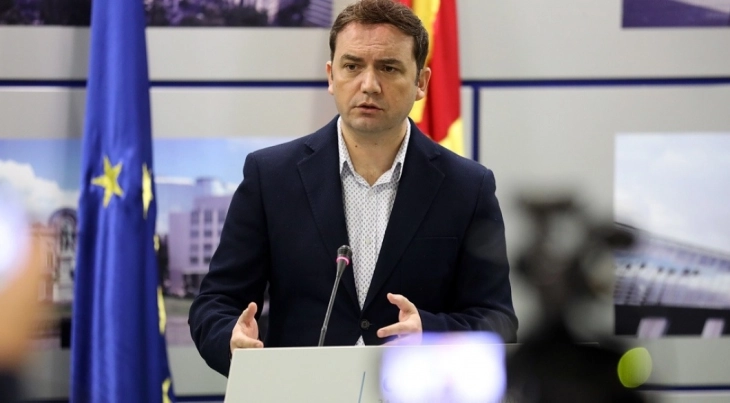Osmani: Bulgaria issue used for daily politics in both countries

Skopje, 29 October 2021 (MIA) – The most important thing is that EU accession negotiations start as soon as possible, by the end of this year. This is in our interest but also of the region, the EU and the Republic of Bulgaria. Overcoming differences with Sofia is a process within the framework of the 2017 Friendship Treaty, but elections in both countries do not contribute to a solution, said Foreign Minister Bujar Osmani on Friday.
“We must find a way to start negotiations as soon as possible and I am pleased that U.S. official Escobar and other EU representatives have alarmed over this, saying the issue cannot hold the stability of the entire region and the European perspective hostage. The other aspect is how to overcome differences, which is a process within the framework of the 2017 Friendship Treaty, through the historical commission. I believe the change in Bulgaria’s approach is a process of self-reflection. I still can’t assess what their intentions are, since we haven’t had regular communication due to the elections, but I always try to promote the thinking that one cannot impose or ban the self-identification right to the other or impose an absolute truth. The state guarantees this to all citizens – the majority community of Macedonians, and then Albanians, Turks, Roma, even Bulgarians who have the right to self-identify and manifest their cultural traits. The state has never banned nor should ban such an option of citizens’ self-identification,” FM Osmani told a press conference.
He regretted the fact that the issue was not protected from daily politics in both countries, since elections are never good for the settlement of these topics.
The FM said discussions between the governments relate to the five-point package, with a meeting to take place in the second half of November. However, there has been no formal request from Bulgaria over the incorporation of Bulgarians in North Macedonia’s Constitution.
Regarding a request for reciprocity for the Macedonian minority in Bulgaria, Osmani said it is a natural instinct that two sovereign countries communicate on the basis of reciprocity, while clarifying that Bulgaria’s constitution does not recognize citizens by ethnicity. The Council of Europe and the European Court of Human Rights proceed upon individual cases and will continue to do so.
He also said that no one in North Macedonia has reported discrimination based on ethnicity thus far.
“Albanians had gone through such restriction but the Framework Agreement ensured inclusion of all ethnic communities through its incorporation in the Constitution. These statements coming from Bulgaria are part of the pre-election process,” noted Osmani.
He said the meetings of Bulgarian associations in North Macedonia with officials in Sofia politicize the issue in the context of the electoral process.
“But as I am myself a member of a community that has gone through such restrictions of self-expression, I can be the channel for communication of such grievances so that we finally put an end to these myths used in the electoral process,” said Osmani.
On the reports of Skopje mayor candidate Danela Arsovska having a Bulgarian citizenship, he said there are no legal impediments for this but the problem is one of ethics and non-transparency.
“Bulgarian or any other citizenship is not a problem, but non-transparency of a candidate is. Nevertheless, this issue will surely do some damage because it will provide arguments to those who claim that people who self-identify themselves in North Macedonia face obstacles in society,” said FM Osmani.







